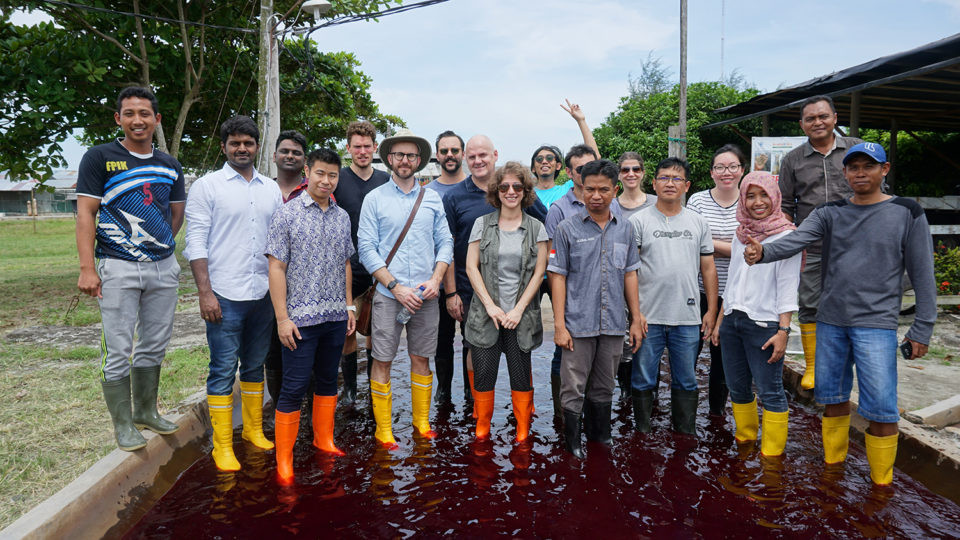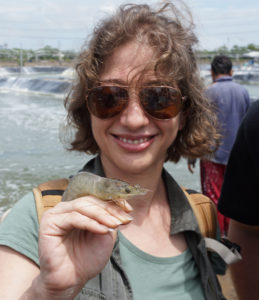Baltimore-based startup’s software imaging platform seeks to provide shrimp producers greater farm-level insights

It’s tough to count the shrimp in your pond when the turbid water in which the crustaceans thrive is simply too murky to see through.
Knowing that accurate in-pond inventory is a dataset the farmed shrimp sector desperately needs a tighter handle on, a Baltimore-based business is on the verge of offering a solution. And it’s got something to do with jellyfish.
A few years ago, while researching at the Chesapeake Biological Laboratory which is part of the University of Maryland Center for Environmental Science (UMCES), Suzan Shahrestani was evaluating jellyfish and their impacts in Chesapeake Bay on the Mid-Atlantic coast of the United States. After a few years of estimating the biomass of the translucent sea creatures, deep in the water, she developed the tools and technology necessary to do the job right: a proprietary blend of sonar hardware, cameras and algorithms.
“By the fourth year, I had this skill where I could estimate animal biomass in dirty water,” Shahrestani told the Advocate. “I thought, ‘OK, who has the problem?’”
Ken Malone, a serial entrepreneur based in Charm City, introduced her to the founders of the Hatch aquaculture business accelerator. “They started talking about shrimp biomass, and I knew exactly what I had to do. I found my problem,” said Shahrestani, now CEO of Minnowtech, LLC. She may be just starting out as a little fish in a big pond – “I’m five-foot-one,” she said – but she is driven by big ideas. (Malone and Kelli Booth, principals of a startup studio called Early Charm Ventures, are co-founders of Minnowtech.)
“I could have stayed in academia, but I wanted to do something for food sustainability,” she said. “I was an environmental scientist, a fifth-year Ph.D., who wanted to be at the forefront of fighting climate change.”
Shahrestani, who hails from the Bronx, New York, is now squarely focused on bringing her technology and passion to aquaculture, which she said is “growing out of necessity,” and to global food security in general. “My parents were immigrants. Having food was a big deal. My father instilled in me the idea that if you’re hungry you can’t think.”
Enrollment in Hatch gave Shahrestani firsthand experience on shrimp farms in Asia, Europe and the Americas, where she learned from producers that miscalculating biomass leads to over- and underfeeding the animals, both of which have negative consequences for farmers, their farms and surrounding ecosystems.

“Beforehand, I was not as up on aquaculture knowledge: the impact, the market, the subject matter and the expertise. You can’t find that in a university,” said Shahrestani, who was awarded the “best contributor” prize during her time in the cohort. “It’s just somebody who carries the entrepreneurial spirit with them. It might have been just the dedication, the hustle. I was trying to build relationships with everyone around me, which happens naturally for me. I was excited to be there, with likeminded people in a niche industry, finding things in common, working toward the same goal. They made fun of me a lot, too. I like to have fun. That’s always a priority.”
The accelerator experience also taught her to always be pitching, and to be constantly refining her story, clearly defining the problem and the solution: “You have to be changing how you talk about it, and understanding your business, because you always have to talk about it,” she said. “They put you through it, and you have to put into it.”
Shahrestani’s efforts are paying off: Minnowtech last month was awarded a $225,000 Small Business Innovation Research (SBIR) Phase I grant from the National Science Foundation in Baltimore, which will support the company’s product optimization – such as making the high-tech cameras more affordable – as well as field trials over the next year.
“Aquaculture needs data. There’s a trickle coming out of the hose; it’s limiting. I want to see that trickle turn into a fountain. That comes from innovation,” she said.
Minnowtech’s goal is to launch its smart monitoring device in the near future – Shahrestani was reluctant to provide a launch date – to “take scientific work out of untrained hands.” She knows the product – both the hardware and the software – has to work.
“We know that our customer base is not in the States,” said Sharestani. “Really understanding your customer’s needs is huge. If I’m developing a fancy product with lots of bells and whistles but farmers can’t afford it, it won’t get adopted. I know that there are people really wanting a solution to this challenge. I have a way to do it.”
Follow the Advocate on Twitter @GAA_Advocate
Now that you've finished reading the article ...
… we hope you’ll consider supporting our mission to document the evolution of the global aquaculture industry and share our vast network of contributors’ expansive knowledge every week.
By becoming a Global Seafood Alliance member, you’re ensuring that all of the pre-competitive work we do through member benefits, resources and events can continue. Individual membership costs just $50 a year. GSA individual and corporate members receive complimentary access to a series of GOAL virtual events beginning in April. Join now.
Not a GSA member? Join us.
Author
-

James Wright
Editorial Manager
Global Aquaculture Alliance
Portsmouth, NH, USA
Tagged With
Related Posts

Innovation & Investment
If it’s broken, fix it: Startup takes on shrimp industry in India
A serial tech entrepreneur and a shrimp trader want to be Amazon for India’s shrimp farming industry. An accelerator program half a world away has brought them closer to their goals.

Innovation & Investment
JALA engineering innovation for Indonesian shrimp farmers
A company in Indonesia hopes the vast network of shrimp farms throughout the country will adopt its IoT device, particularly when they’re on the go.

Innovation & Investment
Now Hatching: Millennial duo’s aquaculture analytics software
In the first startup profile of the inaugural Hatch cohort in Bergen, meet two young software developers who left Washington, D.C., for Norway and the power of personal connections to grow their aquaculture analytics business.

Innovation & Investment
World’s biggest ‘aquaculture playground’ sets up new playdate
The Big Island of Hawaii, home to one of the world’s most innovative and diverse aquaculture centers, will host the next Hatch cohort.

